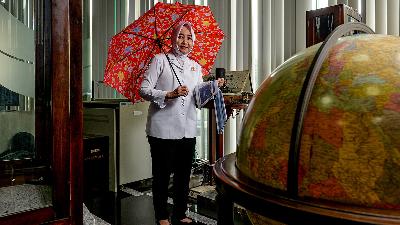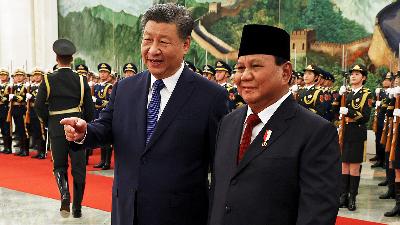A Good Example from Hasanuddin University
Monday, November 25, 2024
Cases of sexual violence on campus often go unresolved. Campus task forces established to handle these cases should include legal experts.
arsip tempo : 174566597726.

THE academic sanctions imposed on a lecturer at the Cultural Studies Faculty of Hasanuddin University, Makassar, South Sulawesi, are a good example of how to respond to sexual violence on campus. Although it did not recommend the harshest possible sanction, the Hasanuddin University’s Sexual Violence Prevention and Handling (PPKS) Task Force recommended the suspension of the perpetrator for three semesters. This recommendation was approved by the rectorate.
The rectorate also dismissed the perpetrator as chair of the sexual violence task force at his faculty. These sanctions are tough because they will have a significant influence on his career. Despite this, the process was not easy. Since the sexual violence incident occurred on September 25 this year, Hasanuddin University’s PPKS Task Force has had to work hard to find evidence. Initially, the perpetrator denied the allegations, but he could do nothing once the task force obtained campus closed-circuit television (CCTV) footage of his actions.
It is not easy to recommend sanctions against a person responsible for sexual violence. And in a number of cases, the people responsible are deanery or rectorate officials, while the PPKS task force is usually staffed by junior lecturers and students. Then there is the threat that the perpetrator will respond by filing a report with the police alleging defamation. This limits the freedom of movement for task force members. Furthermore, the protracted process can lead to the victims suffering further psychological harm.
The PPKS Task Force was established as a result of Ministry of Education, Culture, Research and Technology Regulation No. 30/2021 on the Prevention and Handling of Sexual Violence in Higher Education Institutions. Ten days before the end of his term of office, Education Minister Nadiem Makarim added to the regulation on the handling of sexual violence through Ministerial Regulation No. 55/2024, which added additional details, including the obligation for the PPKS Task Force to follow up on reports even if there is initially no evidence.
Therefore, the PPKS Task Force should be able to see things from the perspective of the victim, and should have an adequate understanding of the law. The Hasanuddin University’s PPKS Task Force did its job well because it is led by Farida Patittinggi, a law professor who served two terms as the Dean of the Hasanuddin University Law Faculty. Task force members with legal backgrounds are needed because the handling of sexual violence on campus resembles an investigation by law enforcement agencies.
Moreover, legal knowledge regarding the collection of evidence is also necessary because the latest Education Ministry regulation gives the PPKS Task Force the authority to report cases of sexual violence it is handling to the police if they feel it is necessary. And legal knowledge also protects members of the PPKS Task Force from the threat of criminalization by perpetrators. This is because, in a number of cases, the perpetrators have reported PPKS Task Force personnel and victims to the police for defamation.
Unfortunately, not every university has a law faculty. As a solution, campuses could collaborate with local legal aid institutions that have a concern for sexual violence against women. This could go ahead if it has the support of the rectorates.
Understandably, punishing perpetrators also needs courage because sexual violence can bring negative impact on the reputation of universities. Of the 354 cases that have been handled by task forces, only 229 ended with sanctions. Most of these were light punishments in the form of apologies. At present, of around 4,000 private universities, 55 percent do not yet have a PPKS Task Force. But, it would be pointless establishing these task forces if they are simply to fulfill the requirement for universities to gain accreditation.











